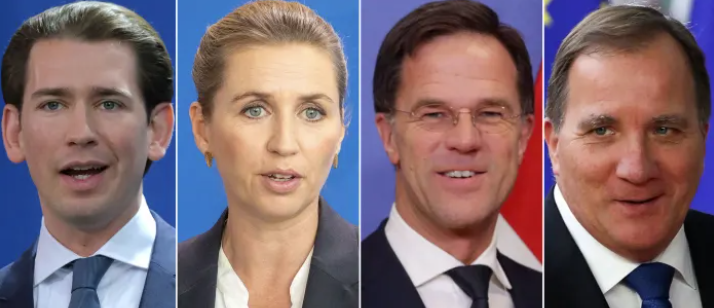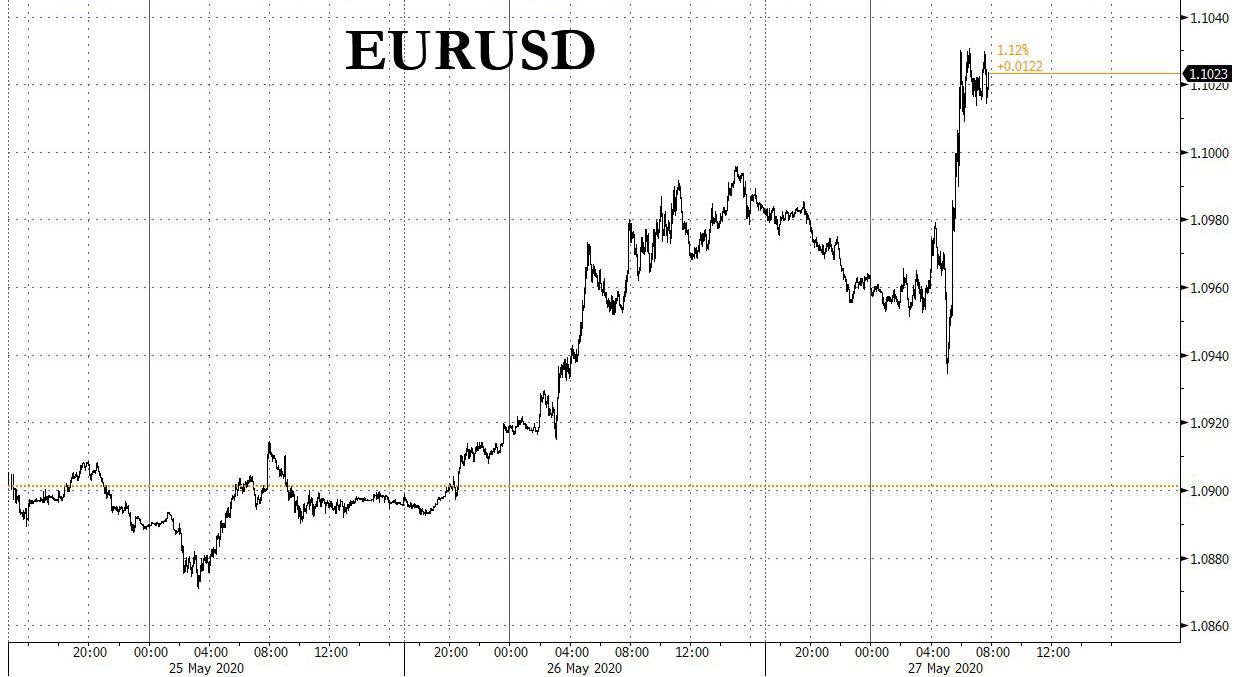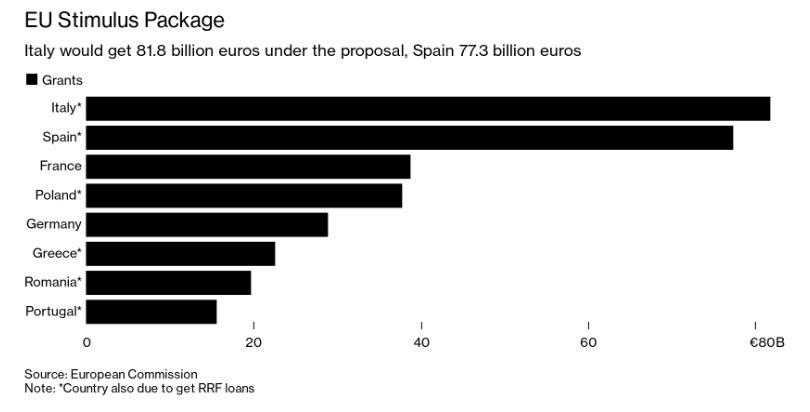
ER Editor: Just a terminology reminder. ‘Net’ contributor countries to the EU are those that pay in more than they get back. Grants are essentially gifts while loans must be repaid.
********
In “Watershed Moment”, European Commission Proposes €750 Billion Virus Recovery Fund
The European Commission unveiled an unprecedented stimulus plan, calling for the power to borrow as much as €750BN on the markets – consisting of €500 billion in the form of grants to member states, and €250 billion would be available in loans – to tackle the worst recession in European history and underwrite struggling Italy’s membership of the 27-nation bloc as it warns that failure to act would leave the EU permanently fractured along economic lines. The euro spiked above 1.10 following the news.
European Commission president Ursula von der Leyen is expected to urge a transformation of the EU’s central finances that would allow it to raise unprecedented sums on the capital markets and hand out the bulk of the proceeds as grants to hard-pressed member states.
The plans follow a high-profile joint proposal from Germany and France, which last week endorsed a recovery fund of €500bn, all of it to be handed out in grants to economically hard-hit parts of the EU. The commission’s proposals match that ambition and add an additional €250bn of borrowing intended to fund loans to member states.
To fund the package, the EU would borrow up to €750 billion on financial markets. The commission is also proposing a suite of new EU taxes and levies to pay back the debt over the coming decades — hitting everything from tech giants to single use plastics — to raise tens of billions of euros a year.
According to Bloomberg, the government in Rome stands to receive 82 billion euros ($90 billion) in emergency grants and up to 91 billion euros in low-interest loans from the package. Spain, which along with Italy has suffered the worst of the pandemic, is in line for 77 billion euros of grants and up to 63 billion euros in loans. Greece could get 32 billion euros in grants and loans. France could get 39 billion euros in grants.
The program, which still needs to win the backing of member states including the so-called “Frugal Four” – Austria, Denmark, the Netherlands and Sweden — which have been pushing for a “loans for loans” approach for the bloc’s coronavirus recovery fund, would be funded by joint debt issuance in a significant step toward closer financial integration.
Peripheral EU bonds rallied on the news, with Italian 10-year yields dropping as much as 9 basis points to 1.457%, the lowest in almost two months. As Bloomberg notes, “the news offered relief in Italy, the original European epicenter of the coronavirus, where the government felt abandoned by the EU at the start of the outbreak and fought to contain a surge of anti-EU sentiment. The reported sum is acceptable for Rome, according to two senior government officials who declined to be named discussing a confidential issue. Rome, however, wants to see what the criteria would be, and under what programs such funds would be earmarked, the officials aid.”
Von der Leyen has spent weeks trying to come up with a response to the crisis, which has shaken the foundations of the European Union. Her challenge was to win round skeptical member states like the Netherlands and Austria in the richer North while generating enough firepower to turn around Italy, where spiraling public debt has raised questions about whether the country will be able to sustain membership of the euro or even the EU itself.
The long-anticipated blueprint, which will be presented to the EU Parliament Wednesday, will form the central plank of the EU’s response to the devastating impact of the coronavirus pandemic. The outbreak, which has claimed hundreds of thousands of lives around the world, has hit every European economy, with the worst-affected predicted to contract by almost 10% this year.
The money would largely fund investment and reforms, while some funds will also go to significantly beef up healthcare and to the EU’s poorest regions to help them catch up. The bloc will also offer guarantees from its budget in order to boost private investments via temporary equity support to viable companies or more capital for sectors of strategic importance such as critical infrastructure, technology and healthcare.
If von der Leyen can win the backing of member states, it would be a “watershed moment” for the bloc according to Bloomberg, where financial burden sharing has long been one of the thorniest issues that’s held back deeper integration. It could quell concerns that a lack of solidarity is empowering populists threatening the EU’s very survival.
Giving help via grants rather than loans has been a key ask by hard-hit EU countries such as Italy and Spain, where increased borrowing to fund the recovery could quickly push debt to unsustainable levels. But even with Germany’s blessing, the plan is bound to face pushback by the bloc’s more stringent members as well as small nations in the region’s east.
The proposal may face stiff challenges: following the proposal by Paris and Berlin, Austria, Denmark, the Netherlands and Sweden released their own blueprint that would instead offer loans to countries rather than grants and would expire after two years, while they’ve insisted that any help has conditions attached to it. As net donors to the EU budget, the so-called Frugal Four are sceptical of a major borrowing spree that could leave their taxpayers on the hook for decades to come.

Meanwhile, poorer peers in central and eastern Europe are also wary of being asked to dole out more money, especially when they risk having funds redirected from them to richer – though harder-hit – nations. Still, even some of these hardline governments have signaled in recent days that they are open to discussing recovery plans without dismissing any outright, leaving the door open to a possible compromise.
************
Original article

••••
The Liberty Beacon Project is now expanding at a near exponential rate, and for this we are grateful and excited! But we must also be practical. For 7 years we have not asked for any donations, and have built this project with our own funds as we grew. We are now experiencing ever increasing growing pains due to the large number of websites and projects we represent. So we have just installed donation buttons on our websites and ask that you consider this when you visit them. Nothing is too small. We thank you for all your support and your considerations … (TLB)
••••
Comment Policy: As a privately owned web site, we reserve the right to remove comments that contain spam, advertising, vulgarity, threats of violence, racism, or personal/abusive attacks on other users. This also applies to trolling, the use of more than one alias, or just intentional mischief. Enforcement of this policy is at the discretion of this websites administrators. Repeat offenders may be blocked or permanently banned without prior warning.
••••
Disclaimer: TLB websites contain copyrighted material the use of which has not always been specifically authorized by the copyright owner. We are making such material available to our readers under the provisions of “fair use” in an effort to advance a better understanding of political, health, economic and social issues. The material on this site is distributed without profit to those who have expressed a prior interest in receiving it for research and educational purposes. If you wish to use copyrighted material for purposes other than “fair use” you must request permission from the copyright owner.
••••
Disclaimer: The information and opinions shared are for informational purposes only including, but not limited to, text, graphics, images and other material are not intended as medical advice or instruction. Nothing mentioned is intended to be a substitute for professional medical advice, diagnosis or treatment.






